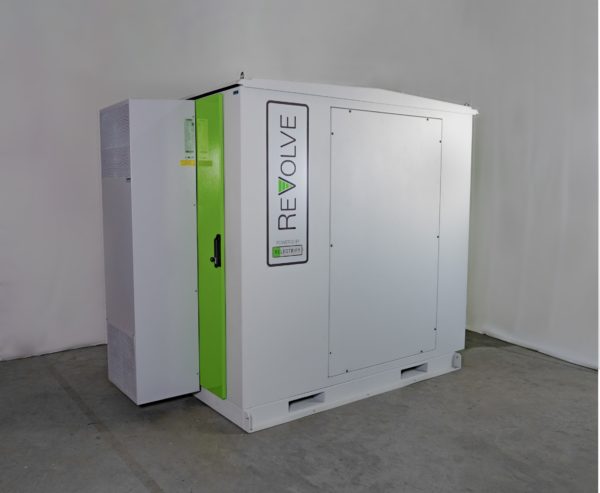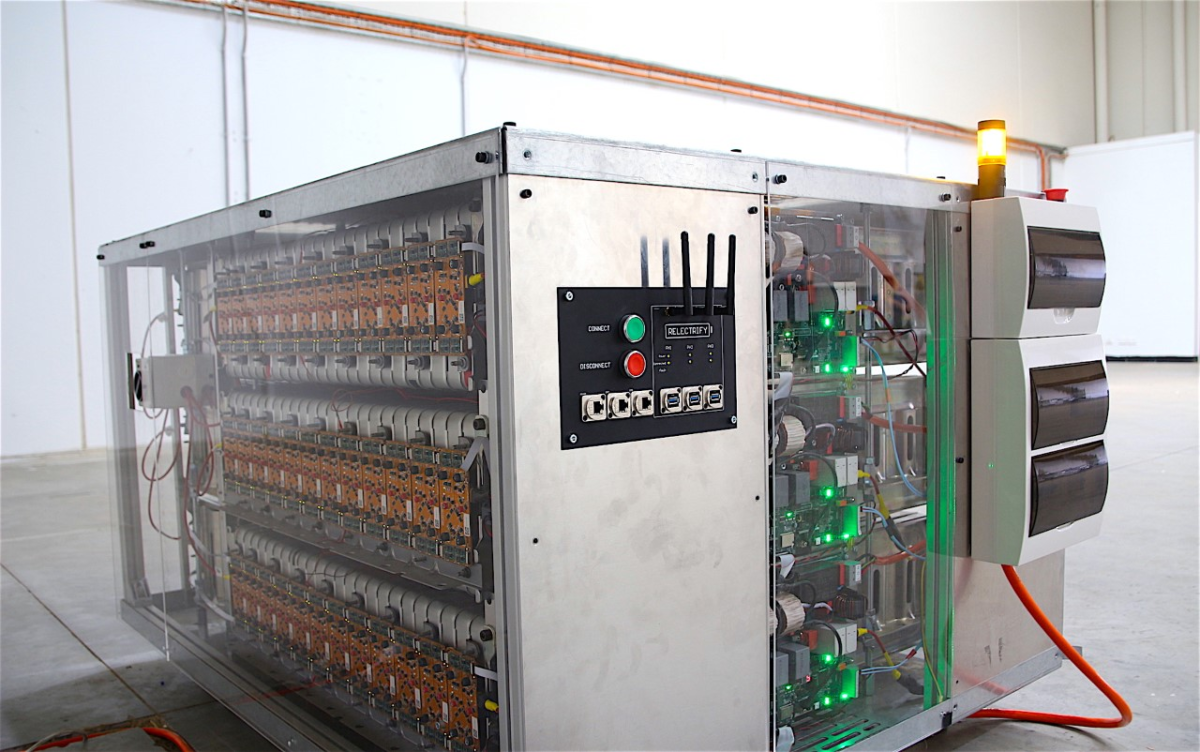Melbourne-based Relectrify has announced it will target utility, commercial and industrial customer applications with the initial release of its ReVolve battery energy storage product, a modular 120 kWh BESS which uses second-life Nissan Leaf EV battery packs.
Fully integrated with the company’s cell-level battery management system (BMS), inbuilt inverter and control system, the ReVolve BESS is designed for installations in the 120 kWh to 2 MWh range.
Relectrify’s CEO and co-founder Valentin Muenzel said each 3-phase unit provides grid-compliant 400-480 Vac output, with 120 kWh capacity and 36 kVA continuous power. The units are suitable for both grid-connected and off-grid applications.
A $1.49 million grant announced this week by the Federal Government-owned Australian Renewable Energy Agency (ARENA) will help finance the initial roll-out of the ReVolve battery units.
ARENA said Relectrify, which has been working with American Electric Power Co (AEP) and Nissan North America on a pilot project, will now finalise development and undertake certifications ahead of the deployment of 20 ReVolve battery units across C&I applications throughout Australia.
“In some ways, we didn’t want to develop this product, but the market really pulled it out of us,” Muenzel said.
“Our pre-sales interest in the product has been very wide, from community battery storage applications, utilities looking for back-up and outage support for weak rural networks, and peak shaving for EV charge installs, to construction and mining services firms interested in stand-alone power supply and genset diesel fuel reduction.
“Given our uniquely competitive price-point, some customers are running the numbers and seeing absolutely phenomenal payback periods with our product.”
Muenzel said Relectrify’s BMS+Inverter technology – which avoids the need for standalone inverters – means the ReVolve is truly competitive pricewise, coming in 30% to 50% lower than comparable products on the market, while offering an expected lifetime of 3000 cycles. And at a roundtrip AC-to-AC efficiency of close to 90%, he said the second-life BESS compares strongly against new industrial storage systems.
“The storage market needs affordable battery storage, and we are thrilled to achieve this market-leading competitiveness with this product from the get-go,” Muenzel said.
“With Relectrify’s cell-level technology seeing increasingly widespread use, we look forward to working with industry leaders to co-develop future products using second-life or new batteries, including for residential, commercial, industrial and grid applications.”

Image: Relectrify
Muenzel acknowledged the launch is an important milestone for the fledgling company but said the validation of a high-performing second-life system at a strongly competitive price-point is the much larger milestone.
EV batteries are often considered to have reached end-of-life when they have degraded to 80% of their initial capacity.
Relectrify is however determined to demonstrate the second-life battery remains a valuable and useful asset in stationary storage applications.
ARENA CEO Darren Miller said the project will help to reduce costs and improve pathways for battery storage to be installed at commercial scale, particularly in industrial settings.
“Battery storage is already playing a crucial role in supporting the transition to renewable energy within industry, however, we need to do more to make it commercially viable,” he said.
“Second-life batteries have significant potential to drive down costs, and Relectrify’s battery management and inverter technology can provide what is needed to transform them into valuable assets for businesses looking to make the switch.
“This new commercial-scale battery – roughly 10 times the size of a Tesla Powerwall 2 – will provide a cost-effective form of battery storage for use in commercial and industrial settings.
“Relecrify’s battery technology could be rolled out in a range of applications such as solar integration, providing back-up power on farms and to microgrids, deferring the need for network upgrade and replacing diesel generators.”
In one recent project example in New Zealand, Relectrify deployed its BMS+Inverter technology combining batteries from nine Nissan Leaf EVs, amounting to a 120 kWh battery system for electricity distributor Counties Power.
Relectrify is now listed on the pv magazine 2021 large-scale storage systems market overview.
This content is protected by copyright and may not be reused. If you want to cooperate with us and would like to reuse some of our content, please contact: editors@pv-magazine.com.









3 comments
By submitting this form you agree to pv magazine using your data for the purposes of publishing your comment.
Your personal data will only be disclosed or otherwise transmitted to third parties for the purposes of spam filtering or if this is necessary for technical maintenance of the website. Any other transfer to third parties will not take place unless this is justified on the basis of applicable data protection regulations or if pv magazine is legally obliged to do so.
You may revoke this consent at any time with effect for the future, in which case your personal data will be deleted immediately. Otherwise, your data will be deleted if pv magazine has processed your request or the purpose of data storage is fulfilled.
Further information on data privacy can be found in our Data Protection Policy.